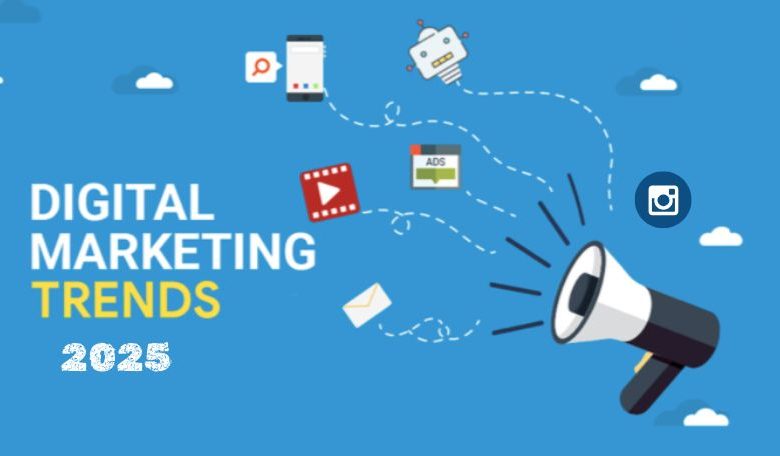The Future of Digital Marketing in 2025: Key Trends and Insights

The world of digital marketing moves quickly, and new technologies, along with altering consumer behavior, influence how businesses engage with people on the web. In fact, a number of trends are in the pipeline to impact digital marketing in the future in big ways. Marketers need to understand these trends if they want to be relevant and adjust their strategies to meet the modern customer’s needs. If you love this field and want to stay ahead, then the best digital marketing course in Noida can teach you the necessary skills to get you ahead.
Here are the top digital marketing trends to watch in 2025:
Artificial Intelligence (AI) as well as Machine Learning.
Ever since they entered digital marketing, AI and machine learning have turned out to be vital tools. They enable a business to know what customers want, show personalized ads, and automate processes. In the next five years, the significance of AI in marketing will only increase as marketers can create ads tailored to each person, and campaigns can optimize automatically.
Why this matters: Marketing is more accurate, effective, and saves time and money, and gives better results. If you want to be a pro in using AI in marketing, the Best Digital Marketing Course in Noida offers you hands-on training on these tools and strategies.
Voice Search Optimization
Voice search is becoming more and more popular, and with devices like Alexa and Google Assistant, as well as those using smartphones, voice search is growing. In 2025, this trend is going to continue to grow, which means businesses must make sure their websites are voice search optimized.
Why this matters: People use voice searches in a more conversational way, so businesses have to be more conversational in their content. It could mean avoiding jargon and writing more directly and concisely in your answers to questions that are inevitably going to come up.
Video Content Dominance
These days video content is becoming more and more popular, especially on YouTube and Instagram. Video will continue to be a form of content the brands love by 2025. Videos are very short and engaging, which is perfect for young audiences.
Why this matters: Brands can distinguish themselves and better connect with the audience by way of video. They’re also more likely to be shared, thus are more likely to increase reach. Learning the art of creating compelling video content is a very useful skill; courses like the Best Digital Marketing Course in Noida are also helpful in video marketing.
Personalization is Key
Today’s customers want personalized experiences. Increasingly, by 2025, businesses will baseline their offers, content, and customer journeys on customer data. Personalized emails, targeted ads, or even custom suggestions can increase the feeling of being valued and understood by a customer.
Why this matters: Personalization creates an amazing way to create stronger relationships with customers and to increase the conversion rates. How marketers can use data to create marketing messages that each person will resonate with and use with the right skills.
Focus on Customer Experience
In an increasingly competitive market, it’s essential to provide customer service that can help make the firm relevant to its clients. By 2025, customer service will be a high-priority factor as well as the integration of every touch point that the customer has with the organization. This means well-structured and highly available websites and timely and relevant interaction with customers.
Why this matters: Engagement means people are likely to patronize that brand again should they have any business with the company. Positive experience results in customer loyalty along with their recommendations. Understanding that it is easy to devote much effort to increasing Minay’s traffic but much more important to make the time spent on Minay enjoyable—that shift in focus can greatly boost your web business.
AR/VR (also known as extended reality or immersive reality)
Currently, some AR and VR technologies are available, and some brands start to use them to attract a customer. It is thought that by 2025, advertising with AR and VR experiences will already be common. For instance, furniture companies could employ the technology to give the clients’ an idea of how a certain piece will appear in their premises, or fashion companies could use the technology to give customers an impression of how certain apparel will fit them.
Why this matters: They offer methods of making marketing engaging—methods that can capture people’s attention in a way that traditional advertising cannot. Even now, it is possible that you are searching for approaches on how you’re able to leverage AR and VR to your benefit in marketing.
Social Commerce
Is it just me, or did social media not serve as a platform for connecting with friends and family, and now we find ourselves shopping there as well? Buying products directly through such social networks as Instagram, Facebook or TikTok is still deemed to continue expanding in the course of 2025 as a facet of social commerce. This trend makes it possible for consumers to stumble across, search, and shop for the products within the app.
Why this matters: Social commerce makes purchasing easier and results in buying on impulse. Oh! Marketers who embrace this trend will reap big from reaching their customers where they frequently spend most of their time.
Ethical and Social Responsibility & Sustainability
People are wising up to environmental and social problems and they do not expect the brands they use to take different. It is anticipated that in the coming years up to 2025 more brands will incorporate message demonstrating their responsible practices with regard to sustainability.
Why this matters: Consumers are more likely to favor brands which have similar values that they have. Using sustainability or community as a focus can be beneficial as it will push your brand’s image and customers to clients.
Data Privacy and Transparency
Lack of privacy for customers is becoming imminent, and organizations should come clean on how they manage customer information. This means that by 2025 there will be more laws and regulations in the area of data privacy. Marketers will also have to know how the data about their buyers will be used and be sensitive to the customer’s preferences.
Why this matters: Since the company has the responsibility of protecting its customer’s details, trust is something that has to be developed with its customers, especially on such an important facet as the privacy of their details. Effective communication and privacy erasure make it possible to strengthen customers’ ties and to enhance the brand image.
Promotion of knowledge enhancement and acquisition of new practical skills.
Thus, it becomes important to keep up with digital marketing and familiarize oneself with available options most of the time. Those professionals who proceed with the concept of carrying out new investment in learning and development will be well positioned to cope with new trends and technologies. By joining the best digital marketing course in Noida, one can only benefit by being trained in the current and future trends.
Conclusion
Future trends of digital marketing in 2025 consist of technology improvement, new consumer expectations and personalization, experience, and responsibility. These trends indicate that marketers who adapt and can learn new approaches will be at an advantage in what is already a highly competitive environment. However, with regard to being successful in this dynamic area of marketing, it is worth joining digital marketing course in Noida. By taking this course, you will be able to learn the various trends to expect whenever you undertake digital marketing and pave the way for a great future in your field.
These trends, therefore, present the need for companies to put into use creative ways of reaching out to their consumers and, in the process, harness the right recipes for success. The future for digital marketing is bright, so being ready for it can truly unlock many possibilities for improvement and change.





